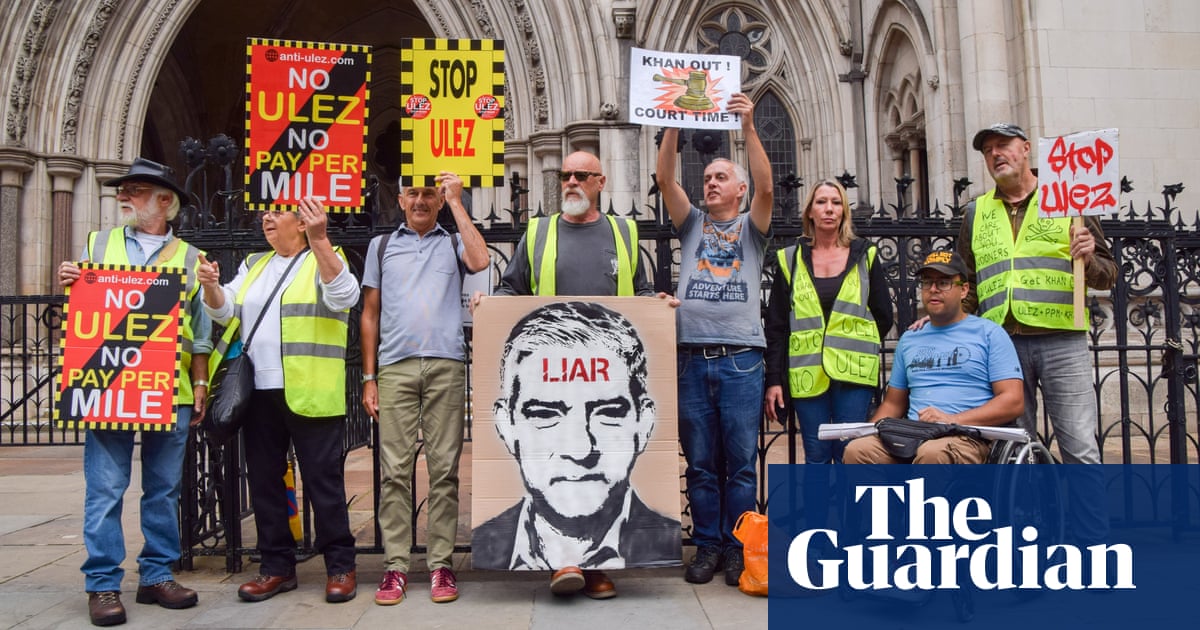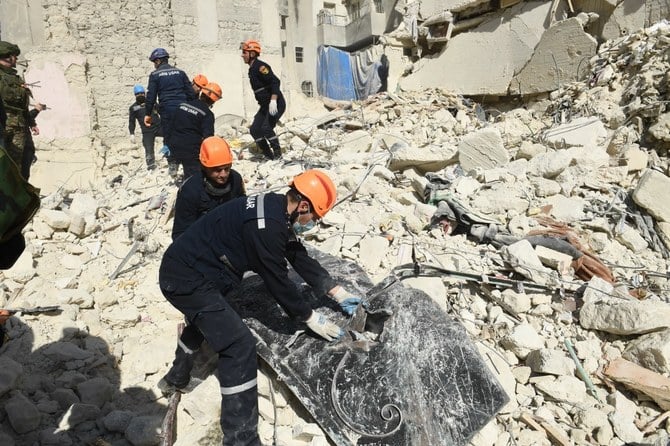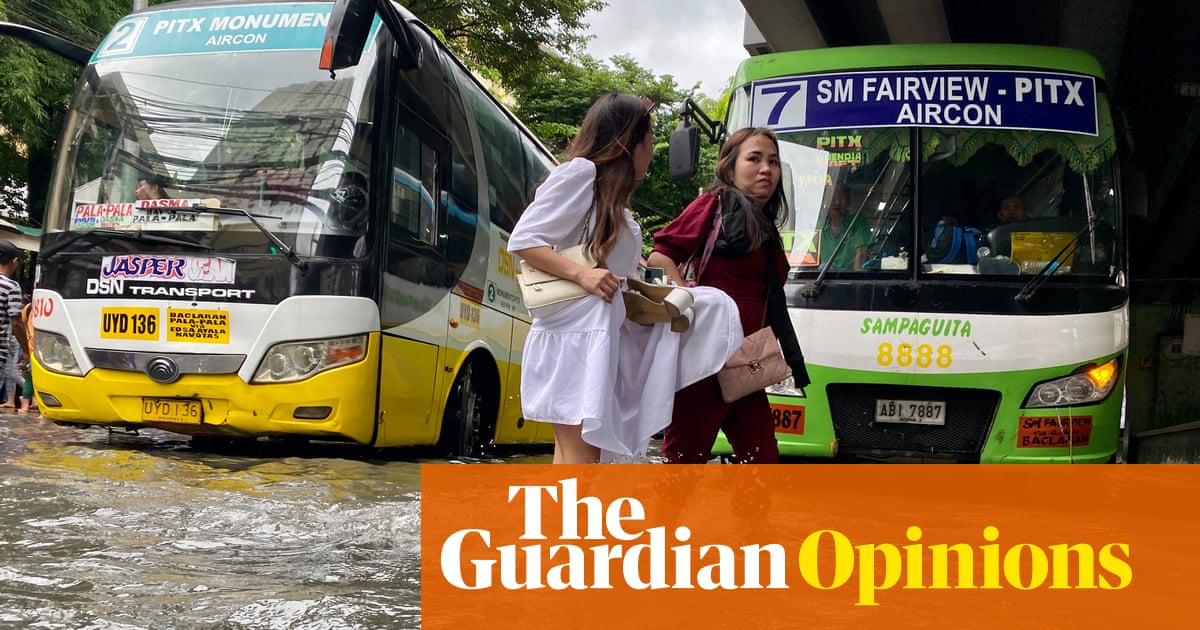
Sadiq Khan has vowed to press ahead with the expansion of London’s low emissions zone saying tackling the climate emergency and air pollution are “bigger than party politics”, despite the Labour leadership urging a rethink of the policy.
After the high court dismissed a legal challenge brought by five Conservative councils, the Labour mayor said he understood concerns of some Londoners but it was right to charge the most polluting vehicles £12.50 a day to drive in the capital’s outer boroughs from the end of August.
He said there would be a “massive expansion” of those eligible for support with the extra costs to small businesses and those in receipt of child benefit but said he would “carry on listening” to those arguing for more mitigations.
The ultra low emissions zone, known as Ulez, has triggered political controversy this week after the Labour leadership suggested the plans to expand it were partly responsible for the party’s failure to take the outer London constituency from the Tories in Uxbridge and South Ruislip.
Rachel Reeves, the shadow chancellor, suggested on Thursday that it was not the right time to “clobber” motorists with an additional tax during a cost of living crisis and Keir Starmer has suggested there should be a rethink of the policy.
Later on Friday, Wes Streeting, the shadow health secretary, was even clearer about opposition to Khan’s policy at the top of Labour, telling Times Radio: “I think Keir has been very clear that he doesn’t want it to go ahead at this stage, as has Rachel Reeves. I would agree with them.
“But Sadiq is the mayor of London. He doesn’t answer to us, he answers to Londoners. If you believe in devolution, you believe in his right to do that. We’re going to have to take it on the chin. And he’s going to take the criticism on the chin and we’ll see what happens.”
It is understood City Hall has ruled out any delay to the policy but it has not ruled out further mitigations, after the big expansion of a scrappage scheme launching next week.
Asked about the objections from his own party, including Reeves saying it would “clobber” motorists, Khan said: “It’s a difficult decision and not one I take lightly but it’s essential we take steps to deal with the air pollution crisis in London. Clean air is a human right not a privilege … We wouldn’t accept dirty water. Why dirty air?”
Pressed by the Guardian on whether he is concerned by the fracturing political consensus on climate measures, the London mayor said the “tackling the climate emergency and air pollution are twin emergencies we have got to address; they are bigger than party politics”.
He highlighted the wild fires in Greece and the heatwave that hit the UK in 2023, causing fires as well. “People think climate change and air pollution are an issue for the global south, or for 30 years’ time. They are an issue for now,” he said.
Khan has staked his mayoralty on the policy ahead of the re-election battle next year, with Conservative candidate Susan Hall saying the court ruling was “a shame” and reiterating her pledge to “stop the Ulez expansion on day one” if elected.
The Uxbridge result appears to have prompted the Conservatives to toy with the idea of watering down their climate policies that are costly to voters in the short term, despite widespread public support for the aims of net zero. Rishi Sunak said he would take a “pragmatic” response to net zero and is reviewing plans to ban new sales of petrol and diesel cars by 2030.
It is understood he is set to launch an “energy week” next week, potentially visiting a carbon capture project to unveil funding in Scotland at the start of the week.
Backers of the Acorn project in Aberdeenshire said it will help ensure the UK drives down emissions, while allowing oil and gas production to continue. Sunak will argue that continued North Sea oil and gas production will protect the UK’s energy security, while investment is simultaneously stepped up to decarbonise industrial clusters. In contrast, Labour has said it will end North Sea oil and gas drilling by not granting new licences.
Sunak was this week urged by former environment minister Zac Goldsmith not to respond to the Uxbridge result by watering down climate commitments. Green groups joined the calls on political parties to stick to the targets on Friday, with Greenpeace UK’s policy director, Doug Parr, saying: “As we enter an era of global boiling, now is not the time for political point scoring over measures to tackle climate change and protect the health of our children.”
Leading doctors and scientists have also warned politicians against abandoning schemes aimed at reducing traffic pollution levels that are linked to thousands of deaths each year.
Transport for London said nine in 10 cars and eight out of 10 vans in London already comply and have no need to pay the charge. Figures from the RAC suggested there are 691,559 vehicles in the capital that will not be compliant, with more entering the capital from surrounding areas.
Khan also criticised the Conservative councils that brought the court challenge for wasting up to £1m of taxpayers’ money on the legal fight. “I say to the Tories: stop using air pollution and climate change as a political problem and work with us to address these twin challenges,” he said.
In their challenge, the outer London boroughs of Bexley, Bromley, Harrow and Hillingdon, along with Surrey county council, launched legal action argued that Khan had failed to adequately consult, overstepped his powers, and had provided a flawed £110m scrappage scheme.
In his verdict, Mr Justice Swift found that the legal basis on which Khan made the decision to expand the Ulez was sound and in line with previous decisions on charging within the capital.
In a summary of his ruling, the judge said he was “satisfied that the mayor’s decision … was within his powers”, and that enough information was given for people who wished to respond to provide “informed responses”. The consultation on the scrappage scheme was “not in depth” but was “lawful”, he said.
Khan immediately confirmed he would expand the zone as planned on 29 August.
He said the current zone covering inner London inside the north and south circular roads had already reduced nitrogen dioxide air pollution by almost half in central London. According to Transport for London, only about 6% of vehicles now entering the zone pay a fee.
Drivers of vehicles that do not meet the Ulez standards are typically petrol cars from before 2006 and diesels registered before 2015.












